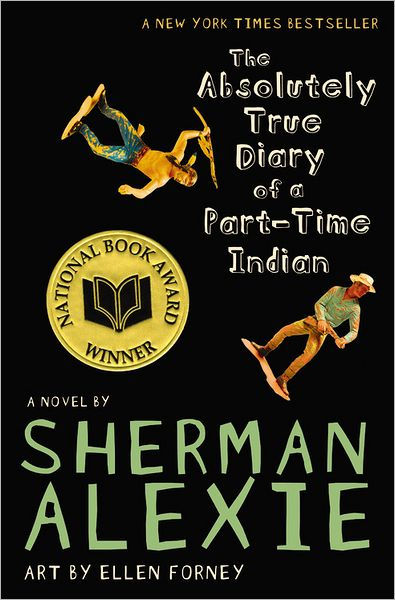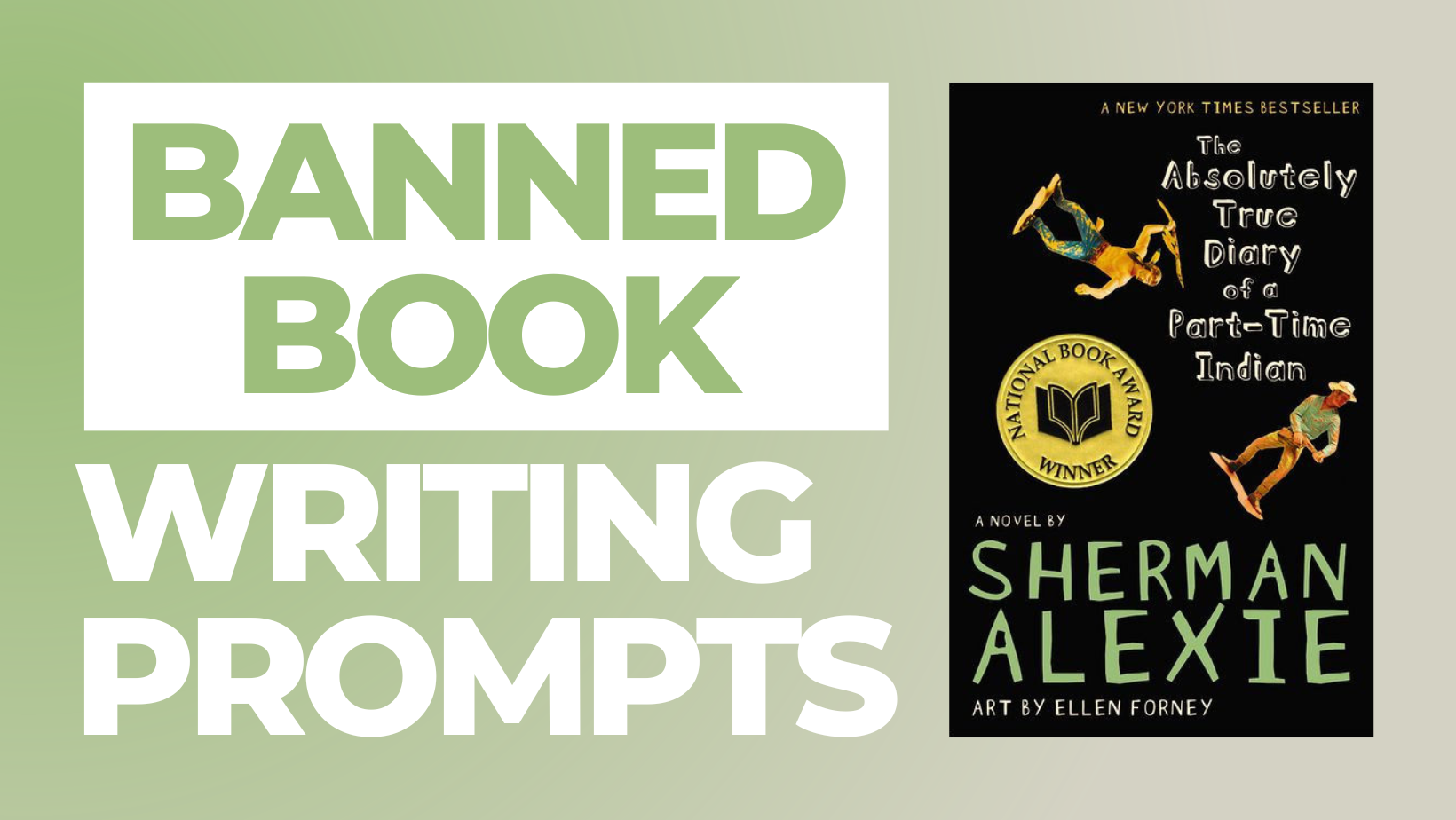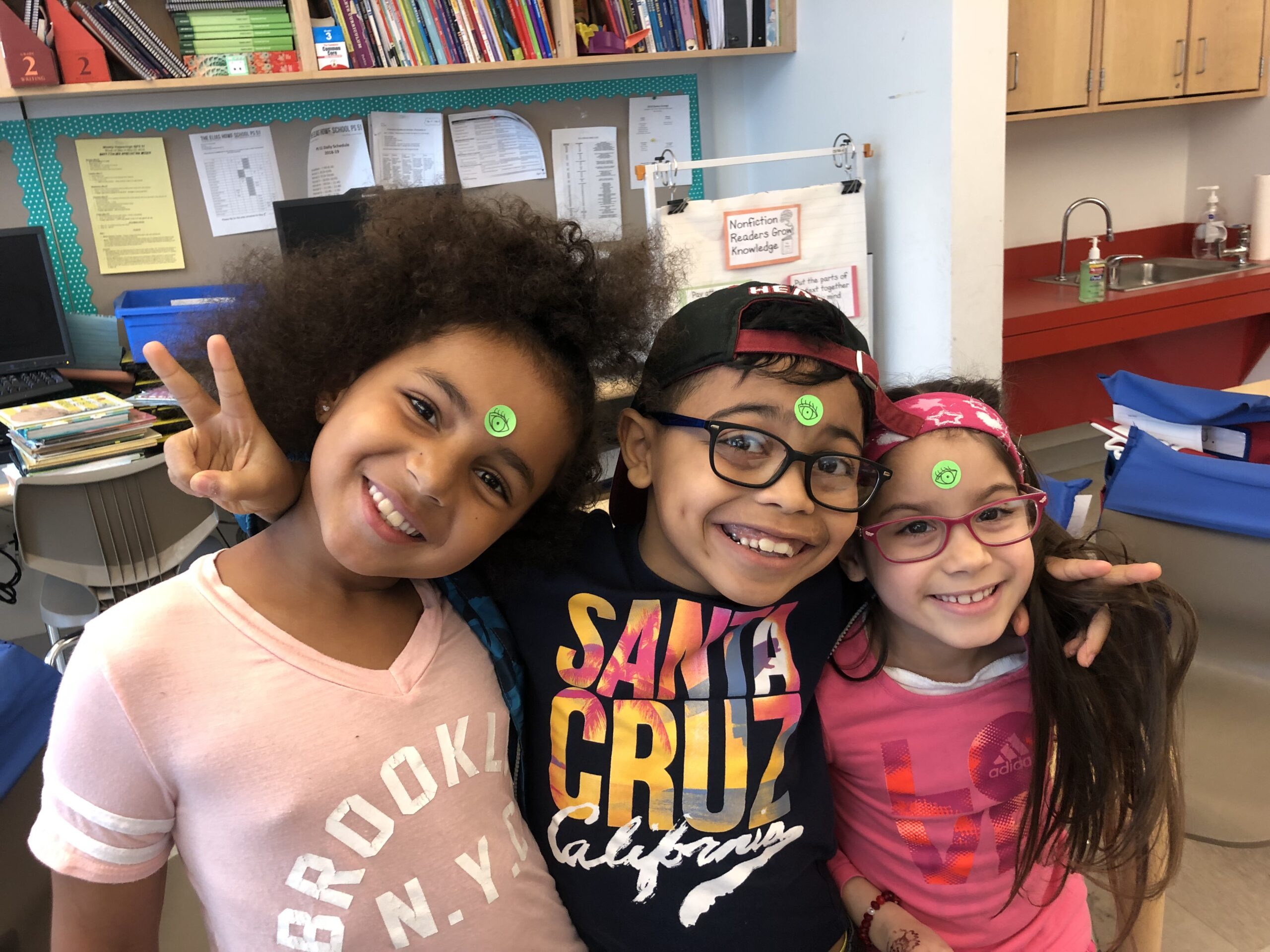In Banned Book Writing Prompts, a new series in Teachers & Writers Magazine, we aim to push back against the growing movement to censor what students can read and to show what happens when we enthusiastically embrace banned works rather than fear them. You can read an introduction to this series by Susan Karwoska here, and you can find more Banned Book Writing Prompts here.
I realized that, sure, I was Spokane Indian. I belonged to that tribe. But I also belonged to the tribe of American immigrants. And to the tribe of basketball players. And to the tribe of bookworms.
—Sherman Alexie
When I first read Sherman Alexie’s The Absolutely True Diary of a Part-Time Indian, I felt like I was taking a breath of fresh air. The same thing happened the second time I read it. And the third. Arnold Spirit/Junior says it like it is, and that makes him the best kind of hero: full of internal conflicts, awkward, vulnerable, brave, scared, embarrassing, hilarious, awake, and inspiring. In short: a living dream squirming inside a precarious, adolescent body.
I love how through the form of a diary containing both writing and drawing, we get to know a boy who does and does not belong to two different worlds: the world of Spokane Indians on the reservation where he grew up and the world of white folks at the school he transfers to. For me, the book raises questions about how we carry our homes with us, even when we may need to leave home, and the places where we feel most “at home.” The book invites me to (re)consider to which tribes I belong and what a “tribe” can be—not just part of our cultural backgrounds or lineages but something we choose and actively create in our relationships, joys, and desires.
The book also opens up for me questions about how we can hold and make space for the messy, irreconcilable contradictions that are a part of each of us, how we can expose and dismantle the problem of whiteness in down-to-earth and even funny ways, and how we can honor what cuts across cultural differences—especially feelings of loss, love, and longing. And it is a book where laughter and tears blur into one, heart-straining, human thing. I want every person on the planet to read this book and laugh and cry with me.

Writing Prompt 1
On page 217, Arnold/Junior lists all the “tribes” to which he belongs, including the tribe of cartoonists, the tribe of chronic masturbators, the tribe of teenage boys, the tribe of small-town kids, the tribe of tortilla chips-and-salsa lovers, the tribe of poverty, and the tribe of boys who really missed their best friends.
To which tribes do you belong? How would you name those tribes? Make a long, wild list of all the tribes to which you belong.
Writing Prompt 2
Throughout the book, Arnold makes difficult choices that cause him to lose and to find important things. He also suffers terrible losses that are outside his control.
He loses his sense of community with the Indians back home (for a while, at least), and he finds a good education. He loses his best friend, Rowdy, and finds a new best friend, Gordy. He suffers the loss of his sister, his grandmother, and his dad’s best friend. He finds in himself courage and trust to shine as a basketball player.
What are some things you’ve lost? What have you found?
Write a poem titled “Lost and Found.” In the poem write about things you’ve lost and things you’ve found. What you’ve lost and what you’ve found don’t need to connect—just see if you can find a way to have both of those realities live together in your poem, in your own way.
If you’re feeling stuck, you might try alternating repeating lines:
“I lost…”
“I found…”
“I lost…”
Writing Prompt 3
A white man shows up to Arnold’s grandmother’s funeral, hoping to return to the family a valuable powwow outfit that he’s been guiltily holding onto and is certain belonged to the grandmother. Arnold’s mother informs him that the outfit could not have been the grandmother’s; he was mistaken. The white stranger leaves, embarrassed, and everyone bursts out laughing:
“For about two minutes, we all sat quiet. Who knew what to say? And then my mother started laughing.
—from The Absolutely True Diary of a Part-Time Indian
And that set us all off.
Two thousand Indians laughed at the same time.
We kept laughing.
It was the most glorious noise I’ve ever heard.
And I realized that, sure, Indians were drunk and sad and displaced and crazy and mean, but, dang, we knew how to laugh.
When it comes to death, we know that laughter and tears are pretty much the same thing.”
What comes to mind when you read this? Have you experienced a time when laughter or tears took over, maybe felt contagious? When have you laughed so hard that you cried? When have you cried so hard that you laughed? What happened? Reflect on any memory or association this passage brings up for you. Write about it.
Writing Prompt 4
The book is presented as an “absolutely true diary” and each chapter is a diary entry containing both writing and drawings. This is an unusual “diary” since most diaries aren’t published books for anyone to read. Play with that form and the tension it invites between writing for yourself and for a public audience. Borrowing the book’s form, compose a “diary entry” that combines drawing and writing and tells a story you’ve never told before. You might use drawings to tell the parts that are hard to write about or to accompany what you’re saying. When you write to yourself and to an unknown reader, how do you tell your story?
Here’s an example from The Absolutely True Diary of a Part-Time Indian:
I was born with water on the brain.
Okay, so that’s not exactly true. I was actually born with too much cerebral spinal fluid inside my skull. But cerebral spinal fluid is just the doctors’ fancy way of saying brain grease. And brain grease works inside the lobes like car grease works inside an engine. It keeps things running smooth and fast. But weirdo me, I was born with too much grease inside my skull, and it got all thick and muddy and disgusting, and it only mucked up the works. My thinking and breathing and living engine slowed down and flooded.
My brain was drowning in grease.
But that makes the whole thing sound weirdo and funny, like my brain was a giant French fry, so it seems more serious and poetic and accurate to say, “I was born with water on the brain.”
Okay, so maybe that’s not a very serious way to say it, either. Maybe the whole thing is weird and funny.
—from The Absolutely True Diary of a Part-Time Indian
Books Unbanned e-library cards are available nationwide to teens and young adults, ages 13 and up, and allow access to the library’s full e-book collection, where you can find many of the titles written about in this series. You can apply for a Books Unbanned Library Card at the Brooklyn Public Library and the Seattle Public Library.
Maya Pindyck is a poet, interdisciplinary artist, educator, and scholar. Her most recent poetry collection, Impossible Belonging, won the 2021 Philip Levine Prize for Poetry and is forthcoming from Anhinga Press in 2023. In collaboration with Ruth Vinz, Diana Liu, and Ashlynn Wittchow, she co-authored A Poetry Pedagogy for Teachers: Reorienting Classroom Literacy Practices (Bloomsbury, 2022). Pindyck taught in classrooms throughout New York City for over 10 years and earned her PhD in English Education from Teachers College. Currently, she is assistant professor and director of Writing at Moore College of Art & Design in Philadelphia.




